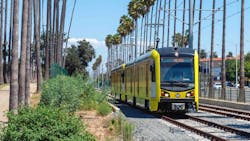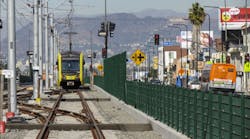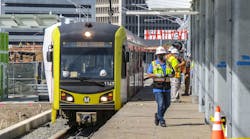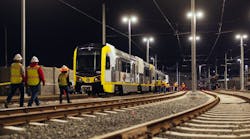After years of planning and six years of heavy construction, Los Angeles County Metropolitan Transportation Authority (L.A. Metro) will welcome riders to the K Line, formerly the Crenshaw/LAX Line, when it opens Oct. 7.
The 8.5-mile line will connect L.A. Metro’s C Line (Green) and the E (Expo) Line with eight new stations, followed by a ninth, Aviation/Century station, that will open in late 2023 providing access to Los Angeles International Airport (LAX). L.A. Metro says the LAX/Metro Transit Center Station along the new K Line tracks is planned to open in late 2024 and will provide easy transfers between Metro and the LAX Automated People Mover that will serve airport terminals.
The project’s opening follows construction delays due to the complex work required of the project and pandemic related challenges.
“The wait is over! We have completed our official line testing and will soon bring new rail service to Los Angeles County residents,” said Glendale City Council Member and L.A. Metro Board Chair and Ara J. Najarian. “The K Line fulfills our promise to build a first-class project that will better connect the Crenshaw Corridor and Inglewood to our region’s transit system and make it far easier to reach the Crenshaw Corridor, Inglewood and LAX without the hassle of traffic congestion, high gas prices and parking.”
L.A. Metro will be offering free rides on the entire Metro Bus and Rail System, including Metro Bike Share, on the K Line’s opening weekend. L.A. Metro says the line “brings a new era of equitable transportation investment” and will provide Inglewood residents with transit service not seen since the 1950s.
“With our opening date set, we’re almost ready to fulfill a dream that started with Mayor Tom Bradley and was carried on for decades by countless community leaders and elected officials: world-class public transportation in South Los Angeles,” said L.A. Metro Board Member and Mayor Eric Garcetti. “The K line is integral to Los Angeles’ transportation future, and in just a few weeks, it will open doors of opportunity for riders across our region and help make Los Angeles a more accessible, sustainable and inclusive city.”
The K Line was designed and built with the help of community input and local voices. This transit project ushered in model programs that are now used on all of L.A. Metro’s major construction projects. For example, this was the first project to employ L.A. Metro’s Board approved small business mitigation programs: the Business Interruption Fund, Business Solution Center, and Eat, Shop, Play. All which helped to support small businesses in this corridor during construction. The Business Interruption Fund awarded more than $20.1 million to over 230 small “mom and pop” shops, Metro’s Business Solution Center provided hands-on business development, support services and referrals to partnering business resources providers to more than 300 small businesses and the Eat Shop Play program provided free marketing assistance to more than 150 businesses along the K Line alignment.
"The opening of the K Line fulfills a promise long made to the people of South Los Angeles and Inglewood,” said L.A. Metro CEO Stephanie Wiggins. “The K Line provides better access to jobs and community amenities for this region of the county, and I couldn’t be prouder of the Metro team for delivering this incredible piece of infrastructure to our community.”
L.A. Metro also implemented a Project Labor Agreement and Construction Careers Policy to encourage construction employment and training opportunities as we built the K Line. More than 60 percent of construction workers hired by L.A. Metro’s prime contractors on the K Line project were from economically disadvantaged areas, 23 percent were hired as apprentices to start their careers in construction and 10 percent were those with social barriers that made it hard for them to find employment. PLA/CCP workers included 63 percent who were Latino, 11 percent African American and three percent female.

Mischa Wanek-Libman | Group Editorial Director
Mischa Wanek-Libman is director of communications with Transdev North America. She has more than 20 years of experience working in the transportation industry covering construction projects, engineering challenges, transit and rail operations and best practices.
Wanek-Libman has held top editorial positions at freight rail and public transportation business-to-business publications including as editor-in-chief and editorial director of Mass Transit from 2018-2024. She has been recognized for editorial excellence through her individual work, as well as for collaborative content.
She is an active member of the American Public Transportation Association's Marketing and Communications Committee and served 14 years as a Board Observer on the National Railroad Construction and Maintenance Association (NRC) Board of Directors.
She is a graduate of Drake University in Des Moines, Iowa, where she earned a Bachelor of Arts degree in Journalism and Mass Communication.






